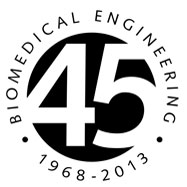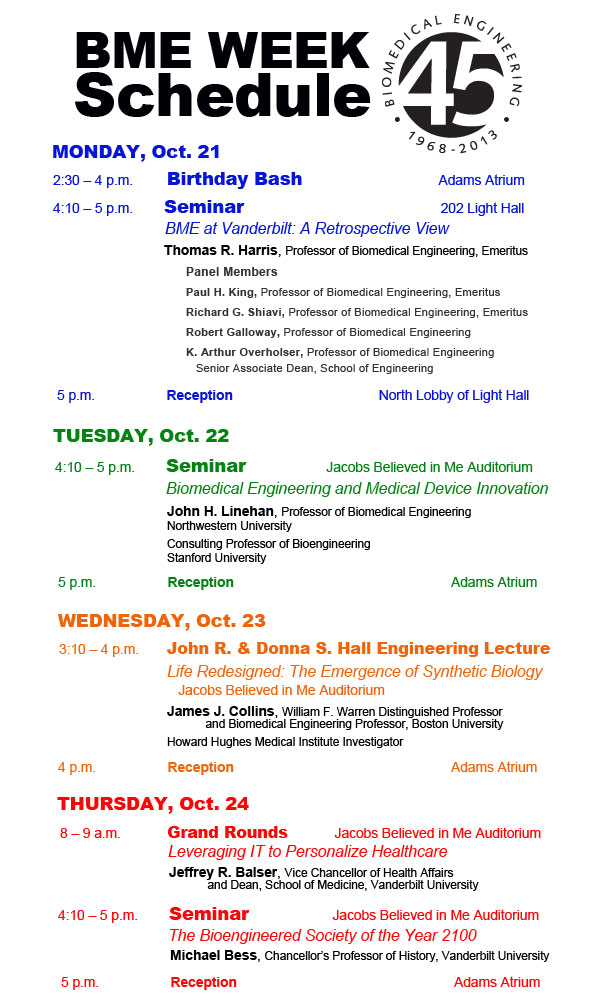 One of the earliest biomedical engineering programs in the United States, Vanderbilt’s Department of Biomedical Engineering is celebrating its 45th anniversary as a program and its 25th anniversary as a department in the School of Engineering.
One of the earliest biomedical engineering programs in the United States, Vanderbilt’s Department of Biomedical Engineering is celebrating its 45th anniversary as a program and its 25th anniversary as a department in the School of Engineering.
BME Week, commemorating these two milestones, kicks off Monday, Oct. 21, with a Birthday Bash, 2:30 to 4 p.m. in Adams Atrium in Featheringill Hall, followed by a seminar delivered by faculty who were key leaders in the formation of biomedical engineering at Vanderbilt. Leading the seminar and a panel discussion is Thomas Harris, Orrin Henry Ingram Distinguished Professor of Engineering, Emeritus. Harris also is emeritus professor of biomedical engineering, chemical engineering and medicine.

Harris has won numerous awards for his leadership in building a strong department in biomedical engineering at Vanderbilt, his national leadership as past president of the Biomedical Engineering Society and his service chairing the departments of bioengineering and biomedical engineering. Panel members include BME Professor Robert Galloway, Senior Associate Dean and BME Professor K. Arthur Overholser, and BME emeritus professors Paul H. King and Richard G. Shiavi.
The week concludes Oct. 24 with an eye toward the future – “The Bioengineered Society of the Year 2100” – a seminar by Michael Bess, Chancellor’s Professor of History at Vanderbilt, who says biotechnologies, even wonderful and powerful ones, will destabilize key aspects of the social order as well as the understanding of what it means to be human.
Undergraduate degrees in biomedical engineering were first offered at Vanderbilt in 1968. This was preceded by a gathering of faculty who had interests in applying a number of the fields of engineering to the scientific and practical problems of medicine and health care. Interest in this activity grew into a Ph.D. program in 1980 and a Department of Biomedical Engineering in 1988.

“Biologically-inspired engineering is a relatively young discipline that has grown very rapidly over the past 25 years. The School of Engineering’s visionary academic leadership and faculty put us at the forefront of this movement 45 years ago,” said Todd Giorgio, chair of the department. “Vanderbilt emerged in the same period as Penn, Johns Hopkins and Drexel, which are the nation’s earliest biomedical engineering programs or institutes first formed and recognized with training grants from the National Institutes of Health in the early 1960s.”
The week’s activities include a number of events as well as the Donna S. and John R. Hall Engineering Lecture Wednesday, Oct. 23, delivered by synthetic biology pioneer James J. Collins, recipient of a MacArthur grant, and a renowned biomedical engineering professor at Boston University. The lecture – Life Redesigned: The Emergence of Synthetic Biology – is at 3:10 p.m. in Jacobs Believed in Me Auditorium. A reception will follow at 4 p.m. in Adams Atrium.

Synthetic biology brings together engineers and biologists to design and construct biological circuits out of proteins, genes and other bits of DNA, and to use these circuits to rewire and reprogram organisms. Collins says these re-engineered organisms are going to change lives in the coming years, leading to cheaper drugs, “green” means to fuel our car and clean our environment, and targeted therapies to attack superbugs and diseases such as cancer.
In his lecture, Collins will highlight recent efforts to create synthetic gene networks and programmable cells, and discuss a variety of synthetic biology applications in biocomputing, biotechnology and biomedicine.
On Tuesday, Oct. 22, John H. Linehan is the featured seminar speaker at 4:10 p.m. in Jacobs Believed in Me Auditorium. A reception follows at 5 p.m. His topic is “Biomedical Engineering and Medical Device Innovation.” Linehan will discuss the innovation process and current training opportunities in the medical device space, and elaborate with examples the early stages in the process of medical device innovation.

Linehan is a professor of bioengineering in the McCormick School of Engineering and Applied Science and professor of medicine in the Feinberg School of Medicine at Northwestern University. Since 2005 he has been a consulting professor of bioengineering in Stanford University’s Department of Bioengineering and the Biodesign Program. In Biodesign, he took the lead in the development of a new program to train young physicians and engineers from developing countries in the medical-technology innovation process.
Linehan was vice president of the Whitaker Foundation from 1998 to 2005. Prior to joining Whitaker, he was the Rose Eannelli-Bagozzi professor of biomedical engineering and the founding chair of the Department of Biomedical Engineering (1989) at Marquette University in Milwaukee, Wisconsin.
Linehan is a member of the National Academy of Engineering. He is a fellow and past president of the Biomedical Engineering Society, a founding fellow and past president of the American Institute for Medical and Biological Engineering, a fellow of the American Society of Mechanical Engineers and a fellow of the International Academy for Medical and Biological Engineering

Jeffrey R. Balser, vice chancellor of Health Affairs and dean of the School of Medicine at Vanderbilt University, will deliver an 8 a.m. Grand Rounds address Thursday, Oct. 24, in Jacobs Believed in Me Auditorium. His topic is “Leveraging IT to Personalize Healthcare.”
In October 2008 Balser became the 11th dean of the School of Medicine since its founding in 1875, and as vice chancellor he oversees all health-related programs at Vanderbilt University. He is a 1990 graduate of the Vanderbilt MD/PhD program in pharmacology. He undertook residency training in anesthesiology and fellowship training in critical care medicine at Johns Hopkins. He joined the faculty at Johns Hopkins in 1995.
Balser returned to Vanderbilt in 1998, and served as Associate Dean for Physician Scientists. In 2001 he was appointed the Gwathmey Professor and Chair of Anesthesiology. He is a member of the American Society of Clinical Investigation, the Association of American Physicians, and has chaired the NIH Director’s Pioneer Awards Committee. He is a member of the Institute of Medicine of the National Academy of Sciences.
Also on Oct. 24, Michael Bess, Chancellor’s Professor of History, will speak at 4:10 p.m. in Jacobs Believed in Me Auditorium. A reception will follow at 5 p.m. in Adams Atrium.

Bess’ talk will focus on a bioengineered society of the future, and he will specifically address three categories of human biotechnology: pharmaceuticals, bioelectronics and genetics.
He will discuss the impact biotechnologies will have on our lives as they come to be applied with increasing pervasiveness to the modification of human bodies and mind. Bess argues that contemporary society is unprepared for these dramatic changes, which are advancing at an already accelerating pace.
Bess is a specialist in twentieth-century Europe, with a particular interest in the social and cultural impacts of technological change. Bess joined the Vanderbilt faculty in 1989 after receiving his Ph.D. from the University of California, Berkeley. He is the author of several books; the latest one is Superhuman Civilization: Justice and Identity in a Bioengineered Society.
Bess has received fellowships or grants from the John Simon Guggenheim Memorial Foundation, the American Council of Learned Societies, the National Institutes of Health/ National Human Genome Research Institute, the John D. and Catherine T. MacArthur Foundation, the Fulbright research grants program, the Woodrow Wilson National Fellowship Foundation, and the University of California’s Institute on Global Conflict and Cooperation.
The student chapter of the Biomedical Engineering Society has planned several events, including a Research Fair during Monday’s Birthday Bash and a Minute to Win It Competition on Wednesday in Adams Atrium. Details will follow about two Friday events.
